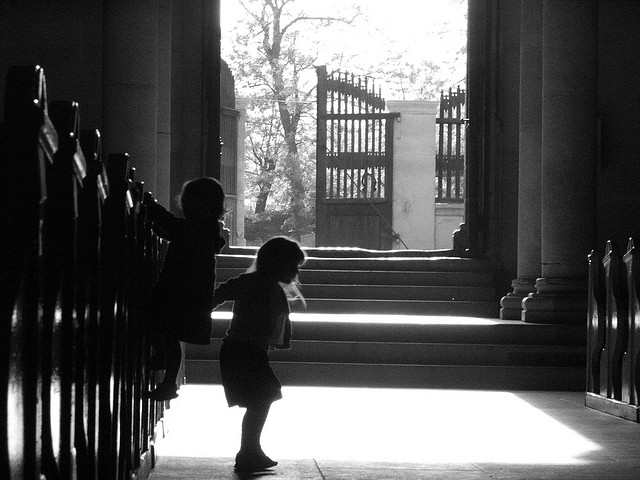Louisville, Kentucky. I don’t know what kind of things your children learn in church, but over the last several years mine have been introduced to the terms “pole dancing,” “harlot,” “cutting,” “sleeping around,” and given a rather vivid insight into the struggles for mental chastity among a set of 75-year-old men. I was driving somewhere three or four years ago when my youngest asked me what was the meaning of a long word the guest pastor (I will call him Dr. Jones) had used the previous Sunday, a word she couldn’t remember but which began with a P. For a few minutes I was stumped, and only as we reconstructed his sermon did I realize what she meant. I suppose it is good, in a way, that I got to be the one defining the word “prostitution” for my daughter, but at the time I felt pretty miserable about it.
We live in an intemperate culture, and while we coddle our children in all kinds of ways, we don’t cut them any slack when it comes to strong language and sexual knowledge. The only truly obscene word in English today is “nigger.” Everything else is pretty much common currency. We yell insults and flip the bird to other drivers, we play the dirty lyrics of Top 40 stations in our own cars, and when we’re down by five some of us will angrily tell a 12-year-old ball player—sometimes our own son, at times someone else’s–that he’s playing like: you know.
Contrary to the pose I am pleased to maintain in public, I am not truly Victorian. I wish I were; under the pressure of my college education, decades of cultural erosion and my own failings, my standards have slipped. I never expected to keep my children innocent for very long. For a while I was in a battle for “just a little longer,” and now that the dike has long been broken I am just trying to prevent a constant flood of trash. And I am failing—even in church.
All of these frank sermons I mentioned—from four different preachers—came from Southern Baptists, but I think Baptists are not alone in this weakness. I suspect this is a scourge of all the evangelical churches, and I suspect it is creeping into the more starched mainline church sermons, too, as it has infected our public talk in so many other places. Hence the seemingly obvious solution, to give up on the Southern Baptist Convention and go somewhere else, may not get me to safer ground, and in any case I have other people to consider.
I find it remarkable, though, that it is not the difference in theology that is making Sunday mornings difficult (not being a Baptist myself), but the difference in cultural standards. I can understand why someone would regard communion as a symbolic gesture, or insist on a full-immersion believer’s baptism, even if I don’t agree with either view. But I cannot for the life of me understand how a grown man can have the stomach to look out on a congregation full of young teenagers and calmly say the word “whore.” Or how a preacher could come up to a mother afterward, as one did to me, and tell her that she should not have taken her sixth-grade daughter (and her daughter’s guest) out of the sanctuary during his description of pole dancing, because that meant the girls failed to hear from him that pole dancing was wrong.
There is a laudable desire in the evangelical churches to confront head-on the sins our culture is especially prone to, and indeed this is true of all churches that take seriously the concept of sin, whatever sins they choose to emphasize. But frankness in front of a mixed audience is a mistake. Some churches will preach in favor of the traditional Christian view on sexuality, and some will preach against it, but what they have in common is their unfortunate desire to preach about it and in some detail, regardless of the first graders in the fourth row.
Actually, the first graders might be all right. This kind of talk will generally go over their heads. But a nine- or ten- or eleven-year -old is an inquiring mind that wants to know, and he will link clue to clue till the day comes when he knows exactly what the pastor means by Sodom and Gomorrah—till Sodom-and-Gomorrah is no longer a fuzzy metaphor for wrongdoing, but a clear mental picture and a visualized fact.
Evangelical churches take seriously the admonition “that all Scripture is written for our instruction,” and I cannot quarrel with that in principle. But I must quarrel with it in practice. If we are not willing to take into account time and place and audience, not willing to follow the Biblical admonition to bridle our tongues, so that we speak in euphemisms that adults will understand but children will not, then we are not responsibly considering how we may be affecting minds which are sinful, certainly—children are not innocent of sin—but which have not imagined certain sins yet.
Dr. Jones, who mentioned prostitution (twice, as an aside unnecessary to his main argument), is not a stupid man and he is a leader in his denomination. But obtuseness will make a hash of the best intelligence. He was preaching to the choir, and not to the choir’s grandchildren, though adults shouldn’t be reminded of such things lightly, either, since our own self-control is highly imperfect, and since a warning is necessarily a reminder that can itself become a snare. Also, like many of us, Dr. Jones is on the web a lot, and in his case on TV, and I think none of us is really good enough to prevail against the barrage of so many screens, in the angry and sexualized and brutalized culture that engulfs us at the least opportunity, however much we may otherwise try to keep ourselves and our families both civil and civilized.
That Sunday Dr. Jones preached from the second half of Luke 17, with his main text being, “Wheresoever the body is, thither will the eagles be gathered together.” The beginning of that chapter contains another verse: “It is impossible but that offences will come: but woe unto him, through whom they come! It were better for him that a millstone were hanged about his neck, and he cast into the sea, than that he should offend one of these little ones.” The “little ones” of that passage are those young in Christ, rather than specifically children, but it is still a hard text for modern parents to hear. Dr. Jones in the pulpit, reaching for an illustration, and I in the pew, trying to stay there, are both guilty.
Photo by James Doepp







13 comments
Mother J
Forgive me, but have any of y’all actually *read* the Bible? Much less tried to *preach* from it? Let’s take a nice little “Bible story” like, say, Noah and the ark. Want to explain to the kiddoes about why the animals went two-by-two? Or what happened to all the people whose dead bodies were floating around, and why? How about that little contretemps involving Shem, Ham and Japheth–what was Noah doing drunk and naked in his tent, and why did Ham’s walking in on him (if that’s all he did: incest with his own mother has been mentioned, as has father-rape) garner a curse…for Noah’s grandson? If you’re coming to the worship of the God of Abraham, Isaac, Jacob, and Jesus to “leave the world behind” (sorry, Fr. J), you might just be happier in an ashram, seeking nirvana, than in a church seeking the Christ who died a criminal, accused of treason against the State. There’s no need to be gratuitously “spicy,” but one of the reasons churches are losing the generations behind us over-60’s is our tendency to tippy-toe around the reality they’re getting exposed to on their smartphones 24/7/365. Maybe it’s just because I’m one of those E-piscopalians…
Joan
This kind of thing infuriates me. Excuse me if I use some strong language here, but this is personal.
While the Christian parent is, in theory, concerned with sin, what is too often at work in practice is less a straightforward protectiveness than a deep, irrational squeamishness. Parents don’t just want to keep their children from knowledge of sexual sin, they want to keep their children from knowledge of sex, period. There are often a lot of out-of-proportion emotions attached: shame, anxiety, disgust, horror. Children are likely to be sensitive to these feelings, and might easily draw from them a notion of sex as entirely taboo, a thing so awful that it cannot even be mentioned. This taboo against the very topic has one particularly dangerous implication. Parents may not intend it, but there is definitely the possibility of a bright child deriving it. That implication is: “If you, my child, get raped or molested, I don’t want to hear about it.”
I speak from experience. And what I know from experience is that, in the aftermath of sexual abuse, a child who respects the taboo and says nothing will receive no comfort or emotional help, and that this can cause more pain than the abuse itself. Children in this situation are, in a sense, orphans, emotionally alone even while, physically, family life goes on. The aftereffects can range from immediate behavioral problems to lifelong inability to trust and to achieve intimacy. Compared to all this, it’s hard to get all worked up about the possibility of tweens hearing about pole dancing from the pulpit.
Fr. J.
As a Catholic priest I can honestly say this isnt a problem in a Catholic setting–except by perhaps a very odd preacher.
I think there are a few barriers to this phenomenon in a Catholic setting. First, throughout the mass we offer some pretty dramatic gestures of reverence and awe before the Lord present in the tabernacle, from genuflections, to extended kneeling, to the beating of the breast. These gestures also remind us of our need for repentance before the Lord. We arent just going to ignore all that and start in on a spicy topic. Furthermore, intemperate speech is one of the things we have to confess, so no need to say spicy things from the pulpit that you have to confess later, and perhaps have to apologize to parents for.
We Catholics have a centuries long tradition of speaking of such things through veiled language so as not to inspire vivid thoughts in another. Impurity is so general that while covering the topics it needs to cover, it doesnt form any particular mental image. Having said this, I dont know that I have ever talked directly about or used the term impurity in a homily. The closest I have gotten was once to say there are things that arent good for our interior life on the internet. And we must avoid them.
Also, I dont think Catholic pastors feel like we are in competition with anyone (though actually we are) so we dont feel the need to constantly up the ante on edgy-ness. I think Catholics come to mass to pray, to take home some inspiration or thought from the homily, and to receive the Eucharist. I dont think we go to mass to have a running commentary on the world, but rather to for a time, to leave it.
robert m.. peters
A preacher and a teacher, among others, should always have the golden mean and age-level or grade-level appropriateness in mind when delivering a sermon or a lesson. However, in the times in which we live, far too many kids, in Kindergarten, already know through the adults around them and through the social media in which they are embedded and which is embedded in them before they begin school the acts and words associated with copulation, fornication, adultery and prostitution, although they probably do not know the words themselves. Through magazine, T.V., video, songs and apps, kids, very young ones, swim is a sea of pornography. If not from the Church, from what authority will then come to know that these things are sinful acts of the heart. We can indeed quibble over how that message is delivered, but delivered it must be!
steve gorton
I remember a long-ago satirical C&W song in which the girl narrator said she was ignorant of sin until the preacher told her. . .
Jon Cook
I heartily agree that some strains of modern evangelical preaching seem to think that to be “relevant” they must be “edgy”, and this is to our detriment. But on the other hand, the book of Deuteronomy was spoken by Moses to all of Israel (presumably impressionable children included), and it certainly references adultery, rape, prostitution, proofs of virginity, and more. So while I’d be inclined to think that a preacher who lingers on describing pole-dancing probably has some issues of his own, it seems we shouldn’t be shy about naming the sins among us. As usual, neither a heads-in-the-sand nor an assault-on-the-eyes-and-ears would seem to be the best path.
SCZ
Bingo.
dave walsh
Well I don’t know how to start, exactly. Two things come to mind – first I guess is that my take is if we don’t know the proper use of something – be it our affection or a block plane or what have you – then it’s quite difficult to know when we are guilty of misuse. A preacher, to my way of thinking, ought to be illuminating folks on the proper use and aim of all things. But I certainly can see where they might want to deliver admonitions every now and again. Probably feels good, as if they are taking a stand. All the same, absent context, admonitions can’t make much sense.
My kids are adults now and I’ve come to think there are some areas of life where more is learned sort of by osmosis. I work off the assumption that the day to day modeling they are exposed to will have the biggest impact; in fact sets the norm against which they’ll measure the words of any particular preacher. This is good and bad.
Which brings me to my other line of thought – it’s good and bad kids learn from our behavior because while we can act as a buffer to the crudeness of our culture, it is also true that we are fallible. Cringe inducing fallibility, at times. I don’t know what sort of transgressions you are lamenting, or if it’s your opinion that generally you are doing a lousy job, but every one of us is walking down that road in some form. Becoming aware of it, acknowledging it, asking for help and forgiveness and keeping on is the story of redemption. And that’s one story the kids need to witness.
Gary Houchens
This is interesting. As a Catholic, I can’t say that I’ve EVER heard any of these topics addressed in a Sunday homily in the parishes I’ve attended. So there has to be some happy medium between your situation (which I agree is extremely problematic) and the tendency of so many pastors to just avoid the topic of Christian teaching on sexuality altogether.
David Smith
This strikes close to home, Miss Katherine! Like you, I despair at a society and “culture” that spirals ever farther downward into baseness and vulgarity; then I realize that it is not merely “out there”, but in me as well, so up close and personal that it escapes my notice.
As a former middle and junior high school teacher, I remember children oh-so-knowing and sophisticated regarding sex, but being virtually ignorant regarding what makes for a stable, loving family and marriage. We’ll mitigate every physical risk to their lives – coddling them to death – and then virtually welcome with open arms the vile, all for the sake of honesty and frankness, of course!
I think a return to Victorian sensibilities of propriety and seemliness might not be so bad!
Comments are closed.